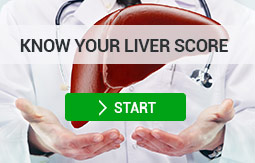Knowing how to prevent alcoholic cirrhosis and how to recognize symptoms early on can help prevent progression of the liver disease. Read our article to learn about alcoholic cirrhosis, and how much alcohol is safe for your liver health.
What’s in this article?
- What is alcoholic cirrhosis?
- Causes
- How much alcohol is too much?
- Symptoms
- Consequences
- Diagnosis
- Treatment
What is Alcoholic Cirrhosis?
Cirrhosis is extreme scarring of the liver resulting from prolonged inflammation. When the liver is continuously or repeatedly inflamed, liver cells will try to repair themselves, but hard scar tissue may form instead of soft healthy tissue. There are different types of cirrhosis depending on the cause of inflammation, including hepatitis C-related cirrhosis, primary biliary cirrhosis and alcoholic cirrhosis. Alcoholic cirrhosis is the most serious type of alcoholic liver disease.
Causes
Alcoholic cirrhosis develops when the liver becomes inflamed from heavy drinking over a prolonged time. According to The American Liver Foundation, chronic alcoholism is the ninth leading cause of cirrhosis in the United States. Between 10 to 20 percent of heavy drinkers will develop it after drinking for about 10 years or more. To find out how healthy your lifestyle is for your liver, you can answer 12 simple multiple-choice questions to get your Liver Health Score results.
How much alcohol is too much?
For most people, moderate alcohol consumption will not result in alcoholic cirrhosis. According to The Centers for Disease Control and Prevention (CDC), moderate drinking is up to one drink for women and up to two drinks for men on any single day. One drink is equivalent to 5 ounces of 12 percent wine,12 ounces of 5 percent beer, 8 ounces of 7 percent malt liquor, and 1.5 ounces of 40 percent distilled spirits or liquor. Two in three adults admit to alcohol consumption above moderate amounts once a month or more. Drinking above moderate amounts can lead to alcoholic cirrhosis. The amount of alcohol that causes cirrhosis varies from person to person. It is not recommended to consume any amount of alcohol if you have cirrhosis or other health conditions.
Symptoms
The symptoms of alcoholic cirrhosis and alcoholic hepatitis are the same. Additional symptoms of the alcoholic type include:
- enlarged spleen
- esophageal varices (abnormal, enlarged veins in the esophagus)
- ascites (the accumulation of fluid in the abdomen)
- portal hypertension (increased blood pressure in a group of veins called the portal venous system), as well as confusion and behavioral changes.
If you experience the above symptoms, speak with your physician as soon as possible.
Consequences
Alcoholic cirrhosis can stop the liver from functioning properly. The liver is the most important internal organ and performs over 500 vital tasks and functions. Alcoholic cirrhosis can lead to serious health conditions like infection and kidney disease from ascites (the accumulation of fluid in the abdomen), liver cancer, a coma, brain disorders, as well as ruptured and bleeding varices (dilated blood vessels in the esophagus or stomach) from portal hypertension, resulting in life-threatening conditions.
Diagnosis
A discussion about a patient’s medical history and history of drinking can help a doctor diagnose alcoholic cirrhosis. Doctors can also perform liver enzyme blood tests and other tests that measure a patient’s levels of blood, white blood cells, sugar, sodium, ammonia, magnesium, potassium and blood pressure. A liver biopsy, an invasive procedure where a sample of liver tissue is removed for examination, can also help diagnose the liver disease.
Treatment
The first step to treating alcoholic cirrhosis is taking steps to stop drinking. A liver healthy diet is also crucial for liver disease patients. Nutritional counseling can help with malnutrition resulting from alcohol abuse. Eating extra protein can reduce the risk of developing encephalopathy, a brain disease and symptoms of alcoholic cirrhosis. Sometimes doctors can prescribe medication, such as corticosteroids to lessen liver inflammation. As the liver disease progresses, a liver transplant may be necessary.
Find out about the nutrition bar that 98% of liver health experts would recommend!
References
www.amsety.com/liver-diseases/
www.liverdirectory.com

 (442) 244-5115
(442) 244-5115











